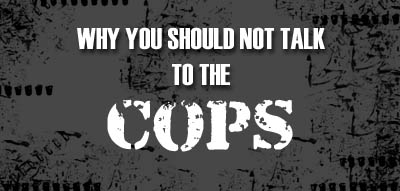Why You Should Not Talk When Interviewed By The Cops




Why Wouldn't You Want To Talk to The Police?
Before we begin I want to state that this is in no way written against any department of Law Enforcement. This is just information for the public to gain knowledge about their rights and the practices of law enforcement when in questioning. I happen to believe that the law is in place to protect the rights and property of all citizens. I applaud all levels of law enforcement because of the tough job they do everyday enforcing and practicing on behalf of the people of the United States.
We are told all our lives to trust the law, they are there to protect us and to put the bad people behind bars, and yes this is true. In most cases the police are there to enforce the laws that have been set forth to ensure our property and safety are taken care of, but there are those times when getting into a situation can be somewhat dodgy. In cases involving false accusations, false evidence, false testimony, or botched investigations your life could be on the line. Yes these cases are the acceptance to the rule but they do happen! We've all seen Shawshank Redemption, would you want to be poor Andy Druphrame? A life sentence for a crime you did not commit? People have spent literally years in prison only to be set free on new found evidence like DNA, these people were put away on hearsay and botched evidence. If the police believe that you committed a crime and you don't have a good enough alibi like I was at work or I was with family then you will be arrested and charged or brought in for questioning (interrogation) and accused of committing a crime or that you are suspected of doing a crime. You will be placed in handcuffs and read your Miranda Rights, once they have read you your rights the officer will ask if you understand the rights and if you respond that you do, you will be put in the back of their vehicle and hauled off to jail. Any questions asked after this will be used against you to try and convict you of the crime. Now yeah most of the time the bad guy gets what he or she deserves, but lets face it the justice system isn't perfect. Knowing your rights is important and you should always protect yourself even against the law.
Your Rights:
The idea of (Miranda Rights) is enshrined in the United States law because of a case in 1966 Miranda Arizona vs The Supreme Court, which found that the 5th Amendment and the 6th Amendment rights of a Ernesto Miranda had been violated while being arrested for rape and kidnapping. He was then set free but did face a second trial and was convicted.
The Courts did not specify an exact wording when informing a (suspect) of their rights but it did set out guidelines for law enforcement to follow…
“The person in custody must prior to interrogation (YES AN INTERVIEW IS INTERROGATION!) be clearly informed that he or she has the right to remain silent and that anything the person says will be used against them in a court of law, the person must be told they have the right to an attorney and to have the attorney present during any questioning, and that if the person is indigent (poor or unable to afford an attorney) an attorney will be provided at no cost to represent the suspect.”
What this means is that this is a warning to the suspect that once they have been placed under the custody of law enforcement that anything they say or do is being recorded and is being used to build a case against them. This warning is to be read in the order above, so you may be warned like this…
Arresting Officer, “You have the right to remain silent. Anything you say can and will be used against you in a court of law. You have the right to an attorney. If you cannot afford an attorney, one will be appointed to you. Do you understand these rights I have read to you?”
Once you answer yes to this last question anything you say is being recorded to be used against you at a later time and the interview "interrogation" process has begun. Once you have waived your Miranda Rights this does not mean you have to continue to answer their questions. You have the right to terminate the interview at any time you wish and invoke your right to remain silent and ask for legal council.
MINORS: If you are a MINOR then you have the right to have a parent or guardian present at the time of questioning. Yes this means after your Miranda Rights have been given you can ask to have your parents contacted and then refuse to speak until your legal guardian has arrived with legal council.
FORIEGN CITIZENS: If you are from another country the rights may be read to you but also added will be... "If you are are not a United States Citizen then you have the right to contact your countries consulate prior to questioning." YES DO THIS!
I am not saying the the police are bad (NOT AT ALL!), what I am saying is that you have rights that should be observed by those enforcing the law; that is if they want to actually be able to make a case against you that will hold up in court. They don't necessarily have to read you these rights but if they don't then your 5th and 6th amendment rights may be violated and the case could be thrown out of court. They are informed and you should be as well. Ignorance is the enemy of anyone and knowledge is your friend.
Your 5th Amendment Rights – Due Process, Double Jeopardy, Self-Incrimination, Eminent Domain
No person shall be held to answer for any capital, or otherwise infamous crime, unless on a presentment or indictment of a Grand Jury, except in cases arising in the land or naval forces, or in the Militia, when in actual service in time of War or public danger; nor shall any person be subject for the same offence to be twice put in jeopardy of life or limb; nor shall be compelled in any criminal case to be a witness against himself, nor be deprived of life, liberty, or property, without due process of law; nor shall private property be taken for public use, without just compensation.
6th Amendment Rights – Trial by jury and rights of the accused; Confrontation Clause, speedy trial, public trial, right to counsel
In all criminal prosecutions, the accused shall enjoy the right to a speedy and public trial, by an impartial jury of the State and district where in the crime shall have been committed, which district shall have been previously ascertained by law, and to be informed of the nature and cause of the accusation; to be confronted with the witnesses against him; to have compulsory process for obtaining witnesses in his favor, and to have the Assistance of Counsel for his defense
What They Don't Want You To Know:
The cops are not your friends, If they have you in custody they are not there to relate to you, to help you, or do anything for you. Their job is to get the bad guy and if they believe you are a participant in a crime then that is exactly what they are going to try and do. They will use logistical tricks when questioning you to try and get you to let your guard down. They are taught to look for specific body language such as slouching, touching the face or the brow of the forehead, eye aversion, pupil dilation when chemically impaired, and to listen for slips in speech. They have been trained in human nature, we all have our tells and the police are masters of learning those tells.
Some of the Tricks
- Language and psychology: To get you to agree to waive your rights the officer may use what they supposedly know by questioning witnesses and what they have gathered as evidence at the crime. Using this information they will put together a picture that makes sense to them, this is all part of the investigation process. They will say this... "Now before you say anything, let me tell you what I already know." This is their way of relating to you! By telling you that they already know what happened they get you to talk about your side of the incident. This puts you on the defensive and you want your story told to get the facts straight. The best thing to do is to sit tight and let the evidence speak for itself and for your legal representative to defend you.
- Intimidation: If you are in an interviewing room the officers may bring a tape recorder or set up a visible camera to record you and ask if you are comfortable with them recording you. If you have nothing to hide you of course agree to this. But they are trying to intimidate you. They may have a surveillance tape they set in front of you or photographs or a written confession statement. All of this is supposed evidence of a crime that you are suspected of doing or being involved in. Remember all interrogation rooms have cameras and microphones set up in them and they begin recording the second you enter the room. They are looking at your body language for signs of guilt and other emotions.
- Lies: Yes it is true, the police can lie to you if they believe that it will get you to tell them the truth. They can tell you that they have evidence they don't have or that they will find out soon if you were there through DNA, fingerprints, or physical evidence, even a confession from another involved party but unless you can be sure that it is true the best thing to do is to keep silent.
Now of course if you did a crime then you did it, admit to it and take it like a man, HEY YOU DID THE CRIME! Now if you feel you may be in a situation where your rights have be violated or that you need legal council then by all means invoke your right to remain silent. All the tactics that the police use are to get to the truth and I'd say 99.99 percent of the time they are right on the money... but there are those times where people have been wrongly accused, jailed, convicted, sentenced, and even executed by giving false statements to the police. Your best bet is to have a legal representative take your case and deal with the details.






